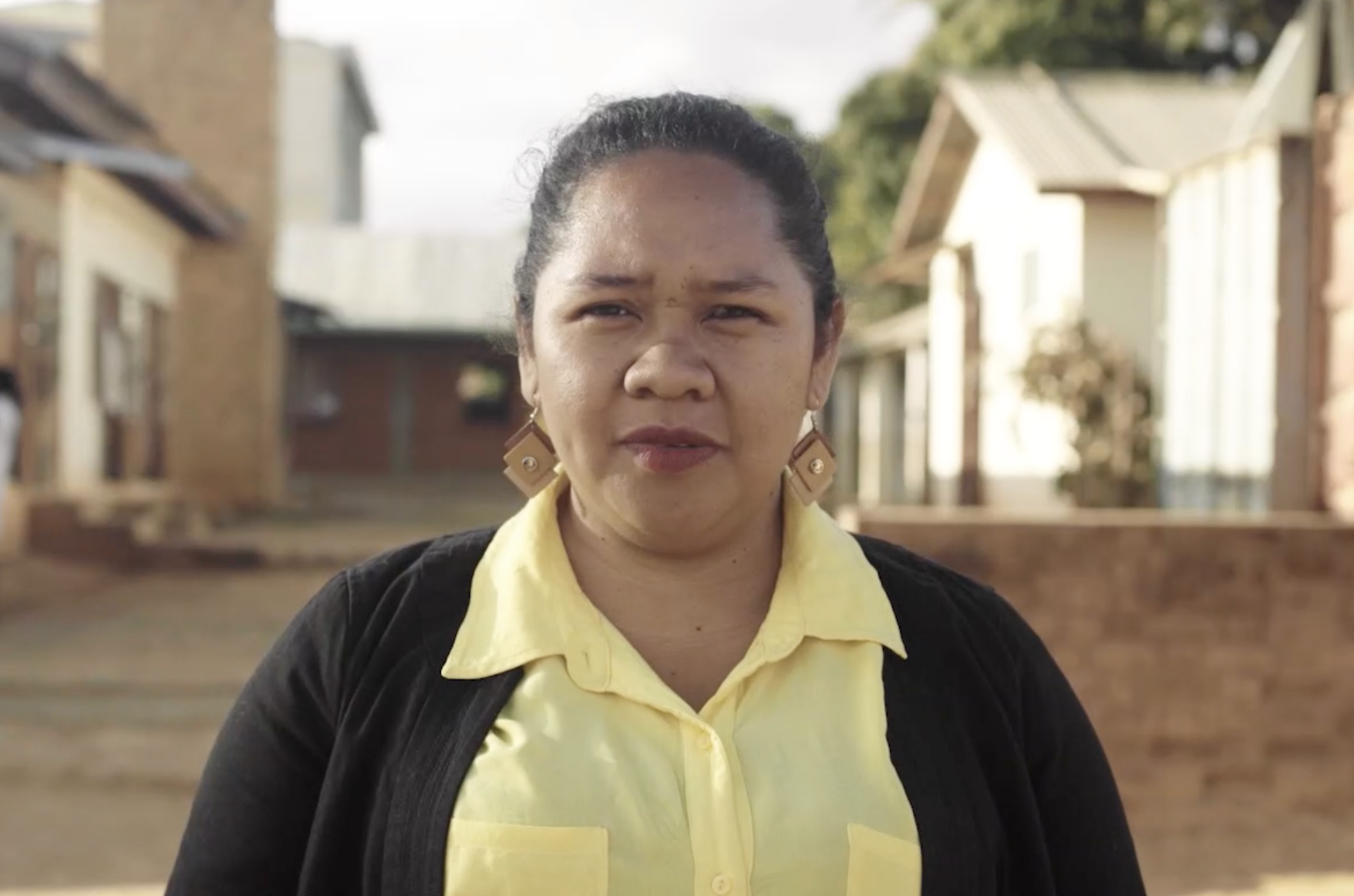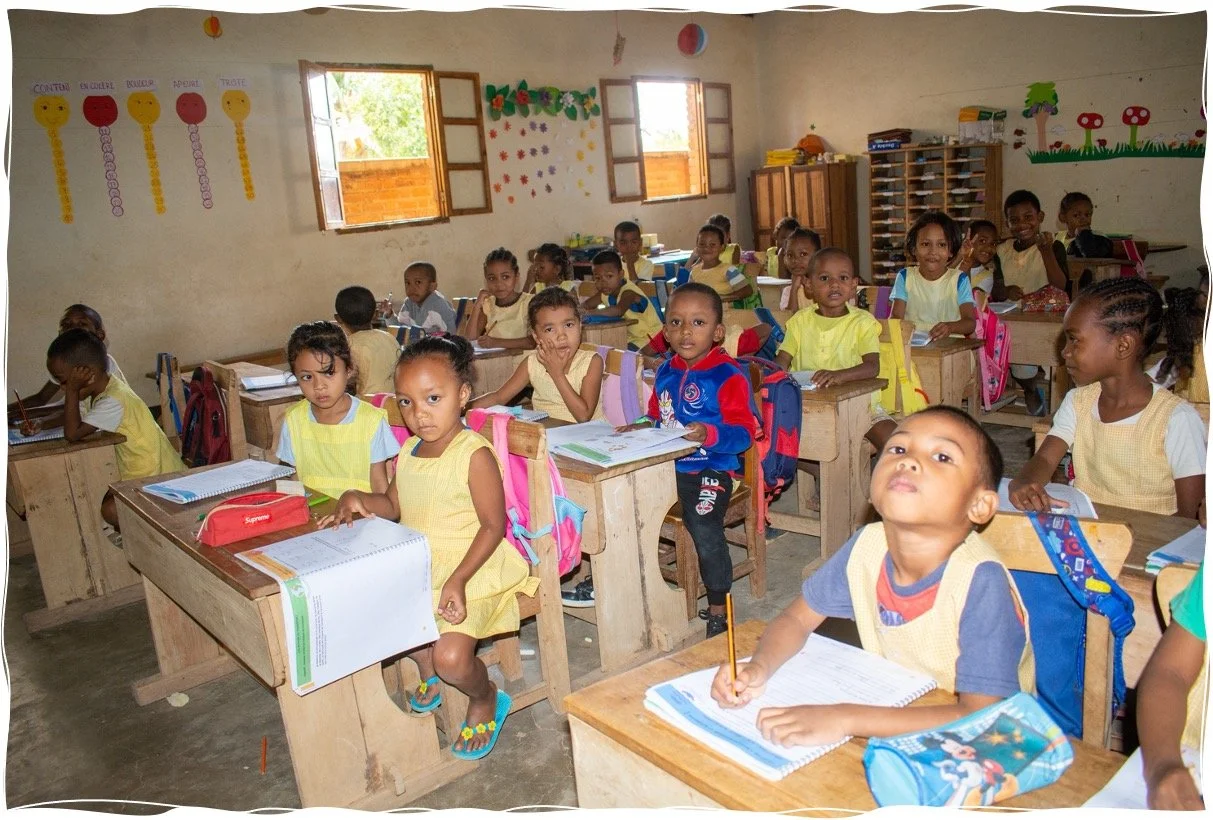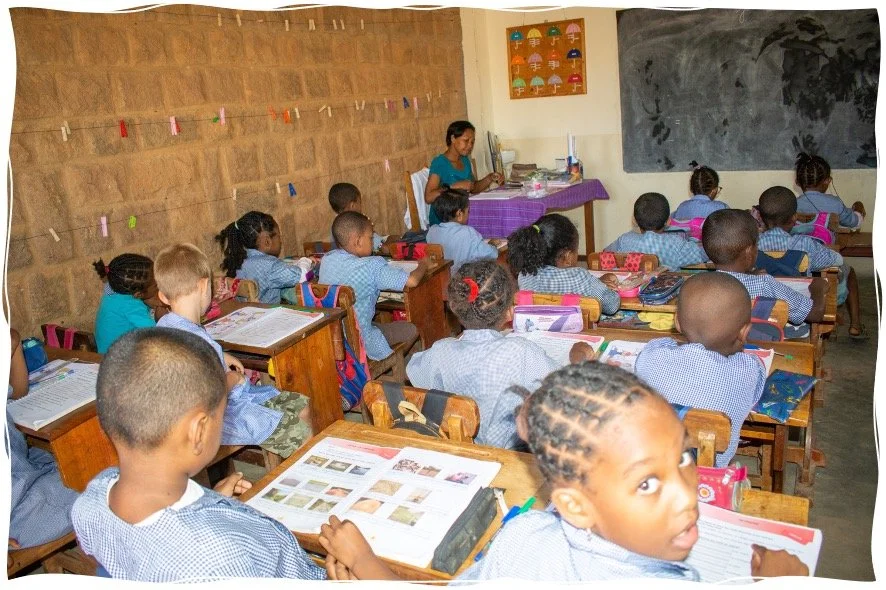The Good News School started as a very small affair. A couple of families had moved to Mandritsara from Antananarivo for the start of the Good News Hospital project, and were wondering what to do for schooling for their 3 school age children. Another couple, Christian teachers from Tana who were working in Mandritsara, had two children about the same age. So the school started as a “home school” with just 5 pupils, meeting in the home of the teachers. This rapidly grew in size as the Good News Hospital project developed, with the initial aim of providing schooling for the children of project staff, both those from Mandritsara and others who had come from further afield in Madagascar, and then also overseas missionary children. Other children were also admitted and the school now meets on two sites and has over 450 children. Mme Faniry is the school principal. We asked her some questions to help us understand more about the school.
1. When is the 25th anniversary of EBN – the Good News School – and what are you doing to celebrate?
The 25th anniversary of EBN was actually last year but the celebration is during the school year 2022-2023 and it will end at the end of this school year on 17th June 2023 with a thanksgiving service. We started with a thanksgiving session last December and we organized drawing and writing competitions for the pupils. Then on 31st March, we held a carnival parade through the town of Mandritsara during which we showed the school flag for the first time. The pupils and parents really enjoyed this. The next thing is a competition to design a school logo. The pupils, the teachers, the parents, former students and former staff at the school are all invited to take part. We also have planned a conference about education for the parents, and our aim is to share the gospel through that conference. That may be later this year.
2. There are many schools, public and private, in Mandritsara. In what ways is EBN different from the others?
First of all, EBN is the only school which seeks to present the Gospel of Jesus to the pupils and parents. We teach Bible truths to the pupils with the aim that they will respond to the gospel and live accordingly. Secondly, here, we care for each pupil in all aspects of their lives – not only their education but also their spiritual and personal lives.
As far as running and financing EBN, it is a non-profit (charitable) institution, though we are always seeking for ways to ameliorate it.
3. Do you have complete freedom to proclaim the gospel or are there any restrictions?
We do have complete freedom. We have pupils from different churches and different religions but we can proclaim the gospel to them all freely.
4. How do you proclaim the gospel to the children?
For pupils in preschool and primary school, the teachers have a programme which starts with the creation in Genesis and follows the Bible story through until Jesus – what He did on Earth, what he has done to save us and how we should follow Jesus. Biblical truths are shared through Bible stories and songs. As for the pupils in secondary school, the gospel is shared through Bible teaching and different activities they do with the teachers. The teachers also seek time to talk individually with the pupils as well as in discussion with the whole class. As for the parents, we especially contact them individually but whenever we have a meeting, we use that as an opportunity to share the gospel with them.
5. Have any children responded to the gospel in the past year or two?
Yes, over the last two years, I have heard from the teachers of 5 pupils, primary and secondary, who responded to the gospel. The teachers have also noticed changes of behaviour in some other pupils apart from the 5 who responded clearly.
6. How do the parents feel about their children hearing the gospel?
Some parents have told us that the main reason that they have sent their children to EBN is the gospel shared at school which impacts their children’s behaviour. Others have said that they are happy to hear their children talking at home about the gospel they have heard at school, and that they have noticed real changes of behaviour in their children.
7. Is there any opposition from the parents (or from the children)?
Not directly, however there are sometimes parents who tell their children that the homework that the teachers give related to Bible learning is not as important as the other homework.
8. Do you have any stories about the Lord working at EBN that you would like to share?
Recently, a girl of 12 came crying to my office, saying that she is being persecuted by her friends because she refused to cheat at an exam. She explained to her friends that she refused to do so because she has already given her life to Jesus and she knows that it is a sin to cheat. It is so encouraging for me to know that this girl did not hesitate to show her friends that she serves Jesus.
9. What are your hopes for the coming years for EBN?
My hope is that The Good News School would be a model school in 3 areas: training boys and girls to become men and women who are leaders in knowledge, leaders in wisdom and good witnesses of Jesus Christ wherever the pupils go.
I hope for a school that has a reputation for showing and sharing God’s love. I hope that each time people outside the school, or the parents or the pupils, are in contact with the teachers and staff, that they might feel Jesus’s love for them and be attracted to follow Him.
I hope for a school which reflects that Jesus is the Leader, that the workers there are all servants of God and the main teaching method is that of Jesus – “Teaching by example,” as most of the time, children will follow the adults’ example more than their words.
Please pray for Mme Faniry and all the staff, that God would give them wisdom and patience, and enable them to show His love as they teach and care for the pupils.
Pray that the pupils would listen to the Bible teaching and trust in the Lord Jesus as their Saviour.
Pray that the 25th anniversary celebrations might bring the gospel to parents and children, and bring glory to God.





